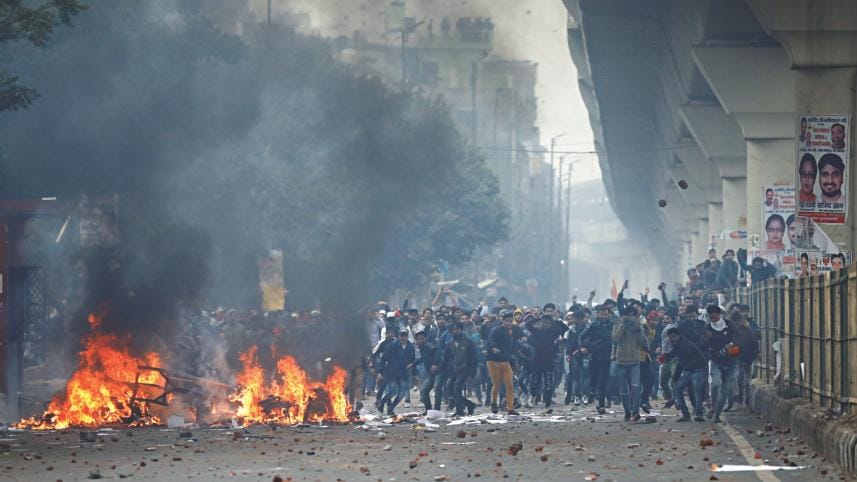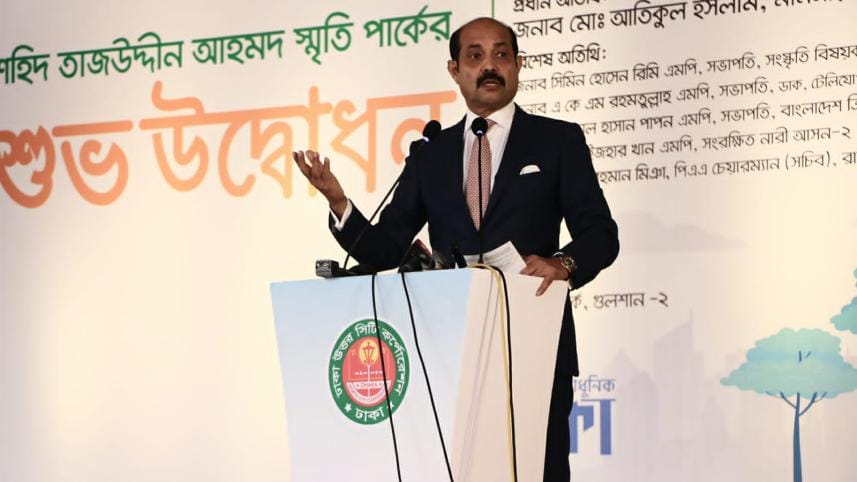‘No CAB, no NRC’

Police fired tear gas at protesters in India’s capital yesterday as tens of thousands rallied around the country against a new citizenship law they say is anti-Muslim, but Prime Minister Narendra Modi remained defiant.
The law grants citizenship to non-Muslims from three neighbouring countries - Pakistan, Bangladesh and Afghanistan - in what opponents say is part of Modi’s Hindu-nationalist masterplan. Critics say the law is unconstitutional because it goes against the country’s secular credentials.
Uproar over the move has sparked days of protests, clashes and riots across India that have left six people dead and dozens injured in a major challenge to Modi since he swept to power in 2014.
In Muslim-populated areas of Delhi yesterday, buses and a police outpost were torched and tear gas filled streets as thousands of protesters hurled stones at police in Seelampur district in the latest violence to hit the capital.

Tens of thousands more rallied in West Bengal, Kolkata and Tamil Nadu states on a sixth day of nationwide protests.
But the prime minister was adamant that the Citizenship Amendment Act (CAA), passed last week, would not affect Indian nationals, including Muslims.
He blamed the opposition Congress party for “spreading violence and creating an environment of fear” by lying about the law’s intent.
“It’s as clear as being engraved in stone that the CAA will not affect any citizen -- Muslim, Hindu, Christian or anyone else,” Modi told a political rally in eastern Jharkhand state.
As the situation remain volatile, Congress chief Sonia Gandhi yesterday met President Ram Nath Kovind as the head of an opposition delegation and demanded that the Centre’s new citizenship law be repealed, reported our New Delhi correspondent.
If he doesn’t intervene the violence may spread further, the delegation told the president. Kovind has reportedly assured them of appropriate action.
In the eastern city of Kolkata, more than 20,000 protesters yesterday joined a fresh march led by West Bengal Chief Minister Mamata Banerjee, a fierce critic of Modi.
Banerjee, who also led protests on Monday, told the crowd the law would not be implemented “for as long as I am alive”.
Addressing a rally in Jadavpur, she reiterated: “Our slogan is ‘No CAB, No NRC in Bengal’.”
She is among at least five state chief ministers who have vowed to reject the implementation of the CAA in their respective states.
Hardening her stand on the NRC, the Mamata government on Monday night ordered a halt to work on the National Population Register which is likely to do the spadework for NRC in the future, a move the central government says is aimed at weeding out illegal immigrants.
Filmmaker Gautam Ghosh, also at the march, told AFP the law would “divide the country”.
“If the federal government tries to implement the law, there will be more bloodshed. People will not accept it,” he added.
Train services were disrupted after railway tracks were blocked by protesters, while nearly 700 people have been arrested, Mamata said.
Authorities have imposed internet blackouts and used force to shut down rallies and sit-ins across several states, more specifically in the northeast region of the country.
In the northeastern state of Assam, the epicentre of the protests where four people died after being shot by police, a curfew imposed in some regions was lifted early yesterday.
The new round of rallies came as the Supreme Court yesterday referred petitions calling for a probe into allegations of police brutality to the states’ High Courts.
Rioters had torched vehicles while police with batons fired tear gas and charged protesting students before storming Delhi’s Jamia Millia Islamia university late Sunday.
The university’s vice-chancellor said Monday 200 people were injured but police put the number at 39 students hurt with 30 officers also injured, one of them critically. Ten people had been arrested for rioting and mob violence but none of them was a student, police told the Hindustan Times yesterday.
Human Rights Watch called for police to show restraint, amid claims authorities were using unnecessary or excessive force to quell the unrest in several cities. Amnesty International also called for police to be investigated over allegations student protesters from Aligarh Muslim University in Uttar Pradesh state were beaten up by officers.
The ripple effect of protests on Indian universities campuses reached top educational institutions in the world including Oxford, Harvard and Yale and MIT where Indian students and scholars studying there staged demonstrations against the police crackdown on students of Jamia Millia University and Aligarh Muslim University (AMU).
Over 400 students from different US universities have issued a joint statement expressing solidarity with Jamia and AMU students batton-charged by the Delhi Police during protests against the Citizenship (Amendment) Act that turned violent.
 For all latest news, follow The Daily Star's Google News channel.
For all latest news, follow The Daily Star's Google News channel.
Comments